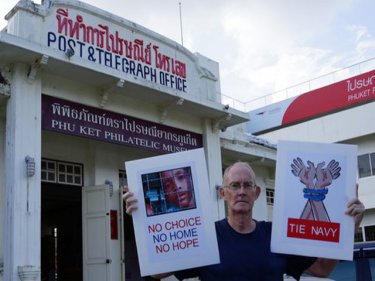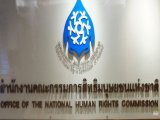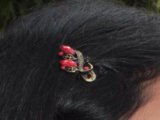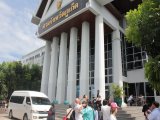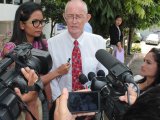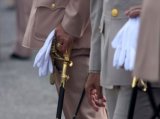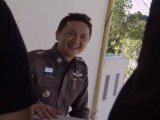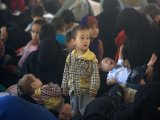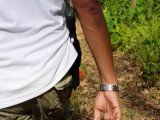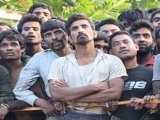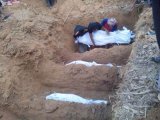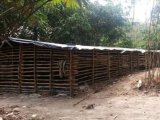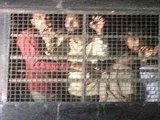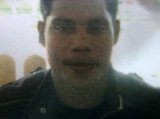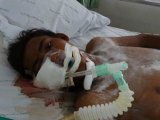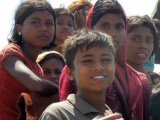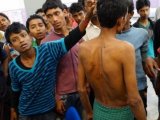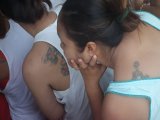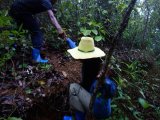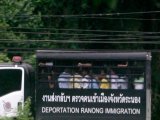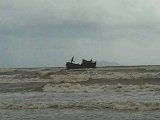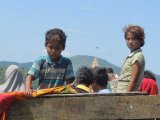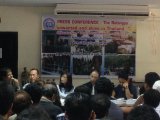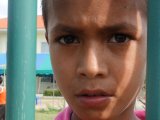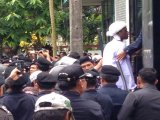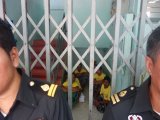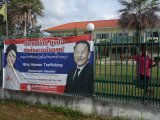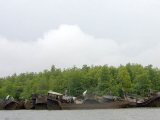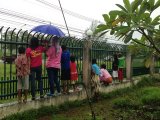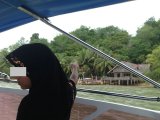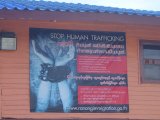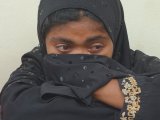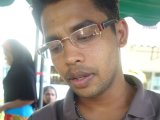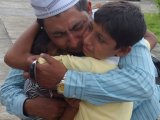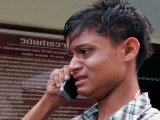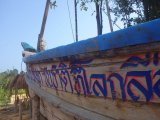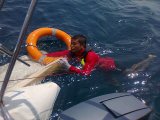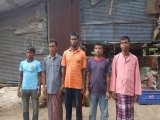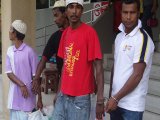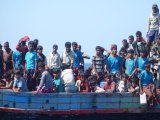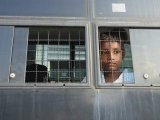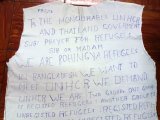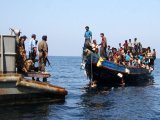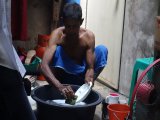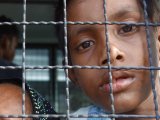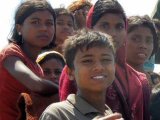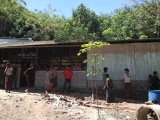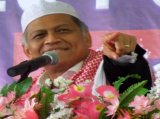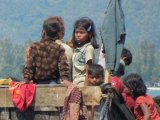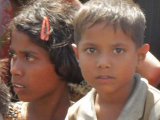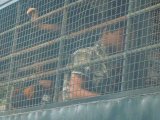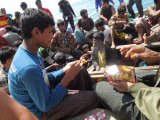World Media Freedom Day, May 3, 2014
JAILED Australian journalist Peter Greste has delivered a powerful statement from his cell in Cairo on his 125th day in detention, acknowledging the international ''outpouring of support'' for his plight.
Peter Greste's speech was delivered by his father Juris to hundreds of Peter's media colleagues and supporters at the annual Press Freedom Australia dinner in Sydney last night to mark Unesco World Press Freedom Day (May 3) - the day Peter will next appear in court.
Peter Greste penned the message inside Mulhaq Al Masra prison where he, Al Jazeera colleagues Mohaned Fahmy and Baher Mohamed and many other local journalists have been imprisoned by Egyptian authorities.
Greste said the journalists were ''deeply moved and strengthened'' by the outpouring of support for their case, which he said had become emblematic of the freedom of the press worldwide.
Worldwide protests, an ''extraordinary'' online campaign, petitions, news conferences and appeals together were ''unprecedented in the struggle to protect press freedom,'' he said.
Greste said muzzling the press was not only a moral affront, but ''an abuse of basic universally accepted social rights and responsibilities - the right to speak freely and openly coupled with the media's responsibility to question, interrogate and challenge those in power''.
''What often gets lost is the fundamental truth that the best defence against insecurity is a vibrant, open, noisy and yes at times even rabid press, willing to snap at the extremists with as much enthusiasm as tearing strips off the authorities,'' Greste said.
''That is why even in a place as apparently stable and open as Australia we must never take press freedom for granted.
''But we must also acknowledge that on this day and for the past few months, press freedom is being vigorously defended, and in a way that would have been unimaginable before our arrest.''
Hundreds of journalists and corporate, government and non-government supporters gathered at Doltone House in Sydney last night for the dinner, which raised funds for the Media Safety and Solidarity Fund that supports journalists at risk in the Asia Pacific and advocates for press freedom across the region and worldwide.
Also last night the Media, Entertainment & Arts Alliance (MEAA) releases its report on press freedom in Australia, 'Secrecy and Surveillance,' focussing on the lack of media access to asylum seekers since the militarisation of customs and immigration activities under Operation Sovereign Borders.
MEAA federal secretary Christopher Warren said the report also catalogued instances of political interference in the editorial independence of the ABC and the threats to the funding of Australia's public broadcasters.
''The report also looks at the revelations of Edward Snowden regarding widespread data surveillance and the illegal misuse of the date collected and shared among foreign intelligence agencies and the implications arising from the harassment of journalist Glenn Greenwald's partner at Heathrow Airport,'' he said.
The report reiterates the MEAA's call for uniform national shield laws and examines the new federal whistleblower protection laws, as well as the ongoing failure of freedom of information laws to ensure open and transparent government.
The report also examines the dire situation of Australian journalists abroad including Greste, Alan Morison who faces up to seven years in a Thai prison on criminal defamation charges for republishing a paragraph from a Pulitzer Prize-winning Reuters story; and the impunity for the killers of the Balibo Five, Roger East and Paul Moran.
To read Secrecy and Surveillance: the State of Press Freedom in Australia 2014 report, visitwww.pressfreedom.org.au
Peter Greste's Message in Full
GREETINGS to you all on World Press Freedom day from Mulhaq Al Masra prison in Cairo. Of course the irony of that remark hardly needs mentioning and yet here we are the Aljazeera three facing our 126th day of detention and our 7th appearance before an Egyptian criminal court on charges of terrorism.
In some respects we should all be flattered. After all it's a measure of the power of the media and the government's fear of it that our words should be regarded as potent as any bombs.
Here in Egypt we have been imprisoned along with many other local journalists, as part of what the authorities have come to describe as their own war on terror. What began as a campaign to put down Islamic militancy has been extended to everyone who in the governments words spreads the ideology of terror.
In the logic of conflict that would seem to include journalists who have even moderate Islamists in their contact books.
What often gets lost is the fundament truth that the best defence against insecurity is a vibrant, open, noisy and yes at times even rabid press, willing to snap at the extremists with as much enthusiasm as tearing strips off the authorities. That is why even in a place as apparently stable and open as Australia we must never take press freedom for granted.
But we must also acknowledge that on this day and for the past few months, press freedom is being vigorously defended, and in a way that would have been unimaginable before our arrest.
We have seen countless protests around the world, an extraordinary online campaign, petitions, news conferences and appeals that together have been unprecedented in the struggle to protect press freedom.
We are of course deeply moved and strengthened by the outpouring of support, but we also understand that this isn't just about the three of us. Nor is it about the wider and far more critical issue of the freedom of speech here in Egypt. Our case has become emblematic of the freedom of the press worldwide.
If by arresting us, the government sought to send a message to journalists both foreign and local working here, then the campaign for our release has sent an unequivocal response. And it is one that is being heard everywhere.
Muzzling the press is not only a moral affront, it is an abuse of basic universally accepted social rights and responsibilities-the right to speak freely and openly coupled with the medias responsibility to question, interrogate and challenge those in power.
The abuses have been committed far too frequently, and not just in Egypt where dozens of journalists remain in prison. From the horrific murder of reporters plainly doing their jobs, to the more mundane though no less sinister silencing of uncomfortable voices through censorship, threats and intimidation in authoritarian regimes around the world it remains all too common for anyone to relax.
We are confident that in time and hopefully soon all three of us will be acquitted and released. And we are all convinced that the campaign has been a vital part of our defence both within and outside court. But it must also be making any government considering a similar crackdown pause for thought.
It's not a revolution but it is a significant moment, and for journalists and those who consume our journalism should all be grateful.
Peter Greste

